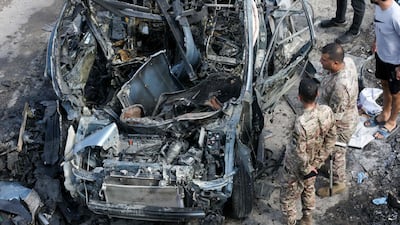Israel killed four people over two days in its continuing air strikes on Lebanon despite a truce that went into effect last year.
On Monday, an air strike in southern Lebanon killed Hassan Atwi, who was blinded last year when Israel detonated pagers rigged with explosives against Hezbollah members. He died along with his wife, Zainab Raslan, as they were on their way to collect their children from school.
Video online shows their car parked at the side of the Zebdine-Nabatieh road, with Mr Atwi in the passenger seat. A drone attacked the vehicle as soon as Ms Raslan returned from a shop and opened the car door.
The Israeli military also bombed sites in the eastern Bekaa Valley on Monday that it said were training bases for Hezbollah's elite Radwan Force. There were no reports of injuries or casualties.
On Tuesday, two people were killed in separate strikes on south Lebanon.
The Lebanese Health Ministry said one was killed and another injured in an air strike on Deir Aames. Another air strike, on an earthmover in Yater, killed one person. Israel has regularly attacked people trying to remove rubble or rehabilitate damaged buildings in south Lebanon, as well as the machinery they used.
Israel says it is continuing to attack Hezbollah members and assets, despite the ceasefire. Hezbollah has not fired a single rocket at Israel since the truce went into effect in November.
The ceasefire terms also require Israel to withdraw its troops from Lebanon, but they still occupy at least five points of Lebanese territory. Israel's attacks are mostly on south Lebanon but it occasionally hits elsewhere, including the Bekaa Valley.
Last week, the UN said more than 100 civilians had been killed in Israeli attacks on Lebanon since the ceasefire began.
It ended two months of heavy Israeli bombardment across Lebanon, accompanied by a limited ground invasion, that followed a year of cross-border attacks between Israel and Hezbollah.
More than 4,000 people in Lebanon were killed and hundreds of thousands displaced.
Much of Hezbollah's weapons arsenal and senior leadership was wiped out. Now, the Iran-backed group is facing intense pressure to disarm from Lebanese factions as well as the international community.

